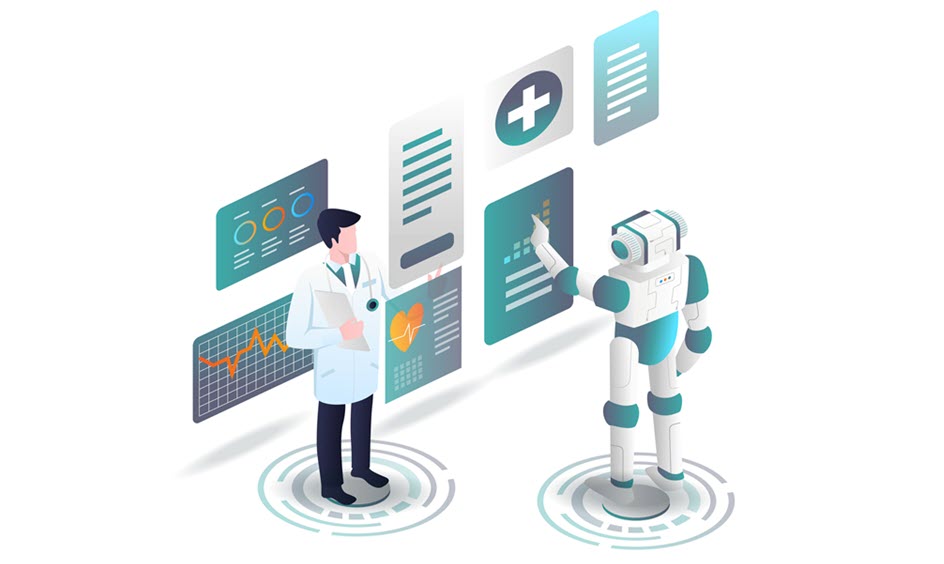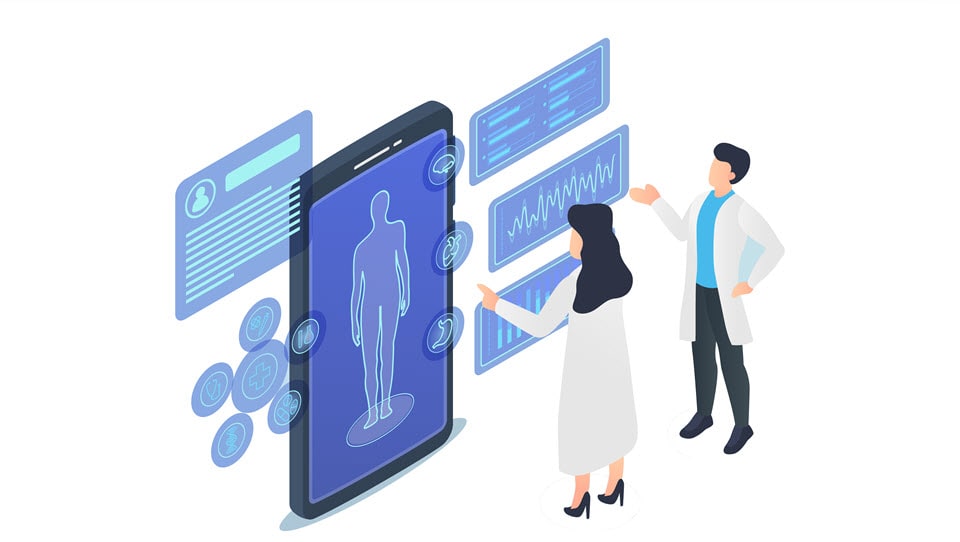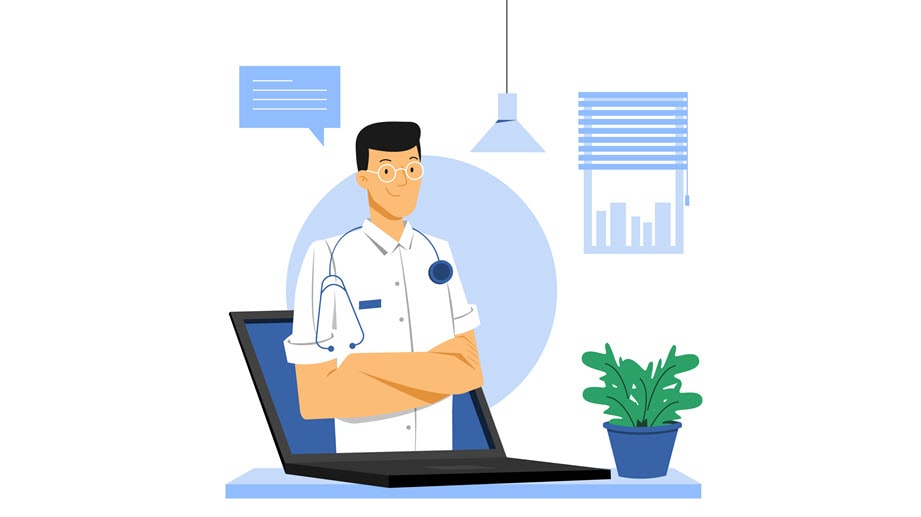- The past decade has witnessed an unprecedented acceleration in the development and application of artificial intelligence (AI). One area where AI has shown enormous potential is healthcare!
- OpenAI’s GPT can assist in diagnosing diseases, recommending treatments, keeping doctors updated with the latest medical research, streamlining administrative duties, and much more.
- This blog will explore different ways GPT can assist doctors in their everyday lives, demonstrating the profound impact AI can have on healthcare.
Did You Know? Did you know that AI can help doctors stay updated with the latest medical research? AI can sift through vast amounts of new research data and highlight the most relevant studies for doctors, ensuring they keep up with the latest developments in their field.
Doctor’s AI Companion: How ChatGPT Enhances Medical Practices and Patient Care Everyday (with Prompts)!
Contents
1. Enhancing Diagnosis and Treatment
2. Streamlining Administrative Tasks
3. Elevating Patient Interaction
4. Augmenting Medical Knowledge
5. Leveraging Predictive and Personalized Medicine
6. Enabling Advanced Medical Practices
7. Improving Collaboration and Communication
1. Enhancing Diagnosis and Treatment
a. Diagnosis Assistance
GPT can assist doctors in diagnosing diseases by analyzing symptoms and suggesting possible illnesses. It incorporates vast databases of medical information to provide accurate and diverse diagnostic possibilities, hence aiding doctors in their decision-making process.
Prompts:
- “Provide possible diagnoses for a patient with symptoms X, Y, and Z.”
- “Analyze these symptoms to suggest potential diseases.”
- “What illnesses could cause these symptoms?”
b. Treatment Recommendations
Once a diagnosis has been made, GPT can recommend appropriate treatments. By considering factors such as disease stage, patient history, and current best practices, it ensures doctors have all relevant information at their fingertips to determine the best course of action.
Prompts:
- “What are the recommended treatments for disease X?”
- “Suggest a treatment plan for a patient diagnosed with Y.”
- “How should we treat a patient with these conditions?”
c. Risk Prediction
GPT’s ability to analyze complex data allows it to predict health risks. By examining patient history, genetic information, and lifestyle factors, it can provide doctors with a calculated risk assessment for various diseases, supporting preventative healthcare initiatives.
Prompts:
- “Predict the risk of disease X given these lifestyle factors.”
- “What’s the likelihood of patient Y developing disease Z?”
- “Given this patient’s history and lifestyle, what health risks should we monitor?”
2: Streamlining Administrative Tasks
a. EHR Navigation
Doctors often spend considerable time going through electronic health records (EHRs). GPT can navigate these records with ease, quickly retrieving patient histories, test results, and previous treatments, saving doctors valuable time.
Prompts:
- “Retrieve the full medical history of patient X.”
- “Summarize the patient’s latest lab results.”
- “What were the previous treatments given to patient Y?”
b. Transcription Service
GPT’s natural language processing ability allows it to transcribe medical consultations efficiently, turning spoken language into written clinical notes. This significantly reduces the administrative burden on doctors.
Prompts:
- “Transcribe this audio recording of a patient consultation.”
- “Convert this voice note into a written clinical report.”
- “Please transcribe the key points from this medical seminar.”
c. Booking and Scheduling
Managing patient appointments can be an intricate task. GPT can automate this process, ensuring smooth scheduling of patient consultations, tests, and procedures. Additionally, it can help set reminders for follow-ups or send notifications to patients, ensuring no appointment is missed.
Prompts:
- “Schedule a follow-up appointment with patient X.”
- “What’s my schedule for the day?”
- “Arrange a series of consultations for patient Y.”
d. Automated Reporting
From creating patient health reports to summarizing lab results, GPT can automate a range of reporting tasks, providing doctors with clear, well-structured information and freeing up more time for patient care.
Prompts:
- “Generate a health report for patient X.”
- “Summarize the key points from these lab results.”
- “Create a detailed report from this patient’s EHR.”

3. Elevating Patient Interaction
a. Chatbots for Patient Queries
A doctor’s time is precious, and answering basic health queries can take up a substantial part of their day. GPT-powered chatbots can answer patient queries round the clock, offering advice on common health concerns, explaining medical procedures, and providing guidance on medication use.
Prompts:
- “What’s the normal range for blood sugar levels?”
- “Explain how chemotherapy works.”
- “What are the side effects of this medication?”
b. Telemedicine
The rise of telemedicine has made medical consultation more accessible and convenient for patients. GPT can support doctors in virtual consultations, providing real-time information and advice. It can help guide doctors through the process, ensuring they’re effectively communicating and meeting patient needs, even from a distance.
Prompts:
- “Provide guidelines for conducting a virtual consultation.”
- “What are the best practices for telemedicine?”
- “Give tips for effective patient communication during a virtual consultation.”
c. Mental Health Support
The role of artificial intelligence in mental health support is expanding. GPT can help doctors provide better care for patients with mental health conditions. It can suggest therapeutic techniques, provide advice on managing stress, and offer insights into mental health trends. While it cannot replace human empathy, it can provide valuable supplementary support in mental health care.
Prompts:
- “Suggest therapeutic techniques for anxiety.”
- “Provide advice on how to manage stress.”
- “What are some common symptoms of depression?”
4. Augmenting Medical Knowledge
a. Medical Research
Medical knowledge is continually evolving, with new research being published every day. GPT can assist doctors in staying updated by summarizing the latest research on various diseases and treatments. It can filter through the vast amounts of scientific literature and extract the most relevant and recent information, enabling doctors to keep pace with advancements in their field.
Prompts:
- “Summarize the latest research on disease X.”
- “Provide a summary of the newest studies in cardiology.”
- “What are the key findings in the recent research about cancer treatments?”
b. Medical Training
Training and education are pivotal in medicine. From interactive case studies to detailed explanations of complex physiological processes, GPT can assist in medical education, facilitating the ongoing learning that is integral to the medical profession.
Prompts:
- “Explain the physiological process of blood clotting.”
- “Provide a detailed case study for a patient with asthma.”
- “Give a comprehensive overview of the human endocrine system.”
c. Pharmaceutical Advice
Given the multitude of pharmaceuticals available, keeping track of all medications, their side-effects, and interactions can be challenging. GPT can provide comprehensive information about various drugs, helping doctors make informed prescription decisions. It can suggest suitable drugs for certain conditions, advise on potential drug interactions, and provide information on appropriate dosages.
Prompts:
- “What are the side effects of drug X?”
- “Provide information on the interactions of drug Y.”
- “What’s the recommended dosage for medication Z for a patient with these characteristics?”
d. Public Health Information
GPT can help doctors retrieve the latest guidelines from public health organizations, ensuring they’re providing the most current advice to their patients. It can also summarize and explain complex public health advisories, aiding in patient education.
Prompts:
- “What are the current CDC guidelines for COVID-19?”
- “Retrieve the latest WHO advisory on vaccinations.”
- “Summarize the recent public health notice on influenza.”
e. Continual Learning
GPT can help doctors keep pace with the evolving medical field, providing updates on new treatments, guidelines, and medical innovations, fostering continual learning.
Prompts:
- “Update me on the latest treatments for lung cancer.”
- “What are the recent advances in neurology?”
- “Provide a summary of the latest medical innovations in the past year.”

5. Leveraging Predictive and Personalized Medicine
a. Predictive Analytics
GPT can analyze vast datasets to predict future health trends. By considering various factors such as patient demographics, genetic information, and existing health records, GPT can identify patterns and predict potential disease outbreaks or health trends. This could be invaluable in shaping healthcare policies and proactive patient care.
Prompts:
- “Predict the health trends for the next year based on this data.”
- “What are the potential disease outbreaks given these health indicators?”
- “Analyze this health data and provide insights.”
b. Genomic Analysis
The field of genomics holds great promise in personalizing healthcare. However, analyzing genomic data can be complex. GPT can help doctors interpret this data, providing insights into a patient’s predispositions to certain diseases and potential responses to medications. This information can be used to personalize healthcare and provide targeted preventive care.
Prompts:
- “Interpret this genetic profile and suggest potential health risks.”
- “What diseases might be suggested by these genetic markers?”
- “Analyze this genomic data and provide a report.”
c. Personalized Medicine
Every patient is unique, and healthcare is increasingly recognizing the importance of personalization. GPT can help doctors tailor healthcare to individual patients. By analyzing a patient’s medical history, lifestyle, and even genomic data, GPT can recommend personalized treatments and lifestyle modifications. This represents a shift towards more patient-centric healthcare.
Prompts:
- “Suggest a personalized treatment plan for a patient with these characteristics.”
- “Given this patient’s lifestyle and genomic data, what personalized interventions might be beneficial?”
- “How should we adjust treatment X for a patient with Y characteristics?”
6. Enabling Advanced Medical Practices
a. Medical Imaging Analysis
Medical imaging is a key diagnostic tool in healthcare, but analyzing these images can be time-consuming. GPT can assist doctors by analyzing these images and identifying potential anomalies. Whether it’s a CT scan, an MRI, or an ultrasound, GPT can provide an additional layer of analysis, supporting doctors in their diagnostic process.
Prompts:
- “Identify abnormalities in this CT scan.”
- “Analyze this MRI and suggest potential diagnoses.”
- “What are the possible interpretations for this ultrasound image?”
b. Remote Patient Monitoring
As technology advances, remote patient monitoring is becoming increasingly prevalent. GPT can help doctors analyze data from these remote monitoring devices, alerting them to any significant changes in a patient’s health. This enables doctors to provide timely care, even when the patient is at home.
Prompts:
- “Analyze these vital signs for any concerning changes.”
- “Monitor the health indicators of patient X and alert for anomalies.”
- “What are the significant changes in the health data of this remotely monitored patient?”
c. Surgical Planning
Surgical procedures require detailed planning. GPT can assist in this process by suggesting the best approach for a particular surgery. By considering factors such as the patient’s health status and the specifics of the disease, GPT can aid in formulating detailed surgical plans. This ensures the surgeon has the best possible plan before going into the operating room.
Prompts:
- “Suggest the best approach for a gallbladder removal surgery.”
- “What factors should be considered in planning a knee replacement surgery?”
- “Provide a detailed plan for a patient undergoing heart bypass surgery.”
d. Pathology Assistance
GPT can help analyze pathology samples, aiding in the identification of disease conditions, and helping doctors to make timely and accurate diagnoses.
Prompts:
- “Analyze this pathology sample and suggest possible conditions.”
- “What diseases might be indicated by these pathology findings?”
- “Help interpret the results of this biopsy.”
e. Drug Discovery
In the realm of drug discovery, GPT can help identify potential therapeutic molecules, speeding up the development of new treatments.
Prompts:
- “Suggest potential therapeutic molecules for disease X.”
- “Analyze the properties of this compound for potential medicinal use.”
- “Identify possible drug candidates for the treatment of Y.”
f. Clinical Trial Matching
GPT can match patients with relevant clinical trials, considering factors like their diagnosis, disease stage, and treatment history. This can lead to more effective treatments and improved patient outcomes.
Prompts:
- “Match patient X with suitable clinical trials.”
- “What ongoing clinical trials are relevant for a patient with disease Y?”
- “Find clinical trials for a patient diagnosed with cancer type Z.”
7. Improving Collaboration and Communication
a. Cross-disciplinary Collaboration
In healthcare, collaboration between various disciplines is crucial. GPT can aid in this process by providing a common platform for collaboration. Whether it’s summarizing a patient’s condition for a specialist or translating complex medical jargon into plain language for a patient, GPT can ensure effective communication, fostering better collaboration.
Prompts:
- “GPT, provide a brief summary of patient XYZ’s medical history and current condition for a cardiologist.”
- “Translate these radiology findings into simple, understandable language for patient communication.”
- “Generate a common summary of a patient’s complex medical history for multidisciplinary team meeting.”
b. Communicating Complex Information
Sometimes, doctors need to explain complex medical information to patients or their families. GPT can assist by translating this information into more understandable language. This ensures patients and their families fully understand their health condition, which is crucial for informed decision-making and patient compliance.
Prompts:
- “GPT, can you explain the concept of chemotherapy in layman’s terms for a patient?”
- “Help me explain the surgical procedure of coronary bypass to a patient in simple language.”
- “Translate this complex neurological diagnosis into easily understandable language for the patient’s family.”
c. Multilingual Support
As healthcare becomes more global, the need for multilingual support grows. GPT can help doctors communicate with patients who speak different languages, translating medical information accurately and efficiently. This ensures that no patient is left behind due to language barriers, promoting equity in healthcare.
Prompts:
- “Translate this discharge summary into Spanish for the patient.”
- “Help me explain the importance of medication adherence to a Mandarin-speaking patient.”
- “Translate this patient’s health complaint from French into English.”
d. Facilitating Medical Conferences
Medical conferences are a cornerstone of professional development for doctors. GPT can assist in these conferences, whether it’s by summarizing key points from a speaker’s presentation or providing real-time transcription services. This ensures that doctors can focus on absorbing new knowledge without worrying about taking detailed notes.
Prompts:
- “GPT, summarize the key points of Dr. Smith’s presentation on advances in immunotherapy.”
- “Provide a real-time transcription of this medical conference presentation.”
- “Generate a list of important takeaways from this webinar on new techniques in surgery.”
e. Ensuring Data Security
In healthcare, data security is paramount. GPT can help protect patient data by identifying potential security threats and ensuring that data handling practices comply with regulations. This not only safeguards sensitive patient information but also helps build trust in AI applications in healthcare.
Prompts:
- “Identify any potential security vulnerabilities in our current data handling system.”
- “Ensure the patient data handling in this research complies with GDPR regulations.”
- “Scan our medical database system for any possible breaches or threats.”
In Conclusion: The Transformative Impact of ChatGPT on Healthcare

Artificial Intelligence has come a long way, and with the advent of technologies like GPT, it has begun to significantly reshape the landscape of various industries, including healthcare. For doctors, GPT can act as an invaluable assistant, enhancing the quality of patient care, augmenting medical knowledge, aiding in complex tasks, and streamlining administrative duties.
From predicting future health trends and personalizing treatment plans to facilitating advanced medical practices and improving collaboration, GPT offers a vast array of functionalities. Its ability to analyze and interpret massive amounts of data can support doctors in diagnosing diseases more accurately, suggesting effective treatments, and even foreseeing health risks. This means more accurate diagnoses, improved patient outcomes, and, ultimately, a healthier society.
However, while GPT holds tremendous potential, it’s crucial to remember that it is a tool meant to supplement, not replace, the expertise and empathy of human doctors. Technology can never replicate the human touch, the empathy, and the instinct that doctors bring to their work. Yet, when used in conjunction with human expertise, tools like GPT can transform the healthcare industry, making it more efficient, personalized, and accessible.
As we move forward, the integration of AI into healthcare will continue to evolve. It’s up to us to leverage this technology ethically and responsibly, harnessing its potential while keeping patient welfare and data privacy at the core of our focus. GPT is not just a tool, but a companion that can help doctors provide the best possible care to their patients. And, as we continue to unlock its potential, the future of healthcare looks brighter than ever.
Did You Know?
Did you know that AI has the potential to predict patient deterioration? Some AI models can analyze electronic health records and other data to predict which patients are likely to become critically ill.
Author: Nik is an experienced author with 14 years in software and tech, holding an IT Engineering degree and a Data Science Master's from Liverpool University. Disclaimer: This website's content is created by humans and refined by AI for better grammar, flow, and clarity.
